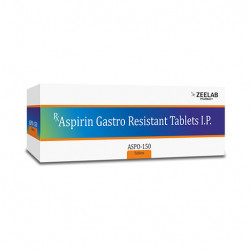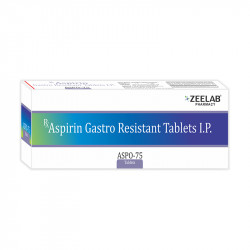Aspirin
Aspirin is a widely used medication known for its pain-relieving, anti-inflammatory, and blood-thinning properties. It is commonly prescribed for managing mild to moderate pain, reducing fever, and preventing heart attacks or strokes by reducing blood clot formation. Aspirin has been a trusted medicine for decades due to its effectiveness and affordability. Available in various dosages, it caters to diverse medical needs.
Uses of Aspirin
- Relief from headaches, toothaches, and muscle pain
- Reduction of fever and inflammation
- Prevention of heart attacks and strokes by reducing blood clots
- Treatment of arthritis and other inflammatory conditions
- Management of mild to moderate pain
How Aspirin Works
Aspirin inhibits the production of prostaglandins, chemicals responsible for pain, inflammation, and fever. It also prevents platelets from clumping together, reducing the risk of blood clots, making it effective for heart health management.
Benefits of Aspirin
- Effective pain relief and fever reduction
- Prevention of heart attacks and strokes
- Reduces inflammation in conditions like arthritis
- Affordable and widely available
- Provides long-term cardiovascular protection
How to Take Aspirin
Aspirin is usually taken orally, either as a tablet or chewable form. It should be taken with food or water to reduce the risk of stomach upset. Follow your doctor’s instructions regarding the dosage and duration of treatment.
Types of Dosage Available
- Low-dose aspirin (75-100 mg) for cardiovascular protection
- Regular-dose aspirin (325-500 mg) for pain and fever
- Extended-release aspirin tablets
- Effervescent or chewable aspirin tablets
Side Effects of Aspirin
- Common: Stomach upset, nausea, or heartburn
- Moderate: Dizziness, mild bleeding, or ringing in the ears
- Severe: Allergic reactions, severe bleeding, or stomach ulcers
- Rare: Liver or kidney issues in long-term use
Safety Advice
- Do not use if allergic to aspirin or other NSAIDs.
- Consult a doctor if you have a history of stomach ulcers or bleeding disorders.
- Avoid alcohol while taking aspirin to prevent stomach irritation.
- Not recommended for children under 16 due to the risk of Reye’s syndrome.
- Inform your doctor if you are pregnant, breastfeeding, or taking other medications.
Frequently Asked Questions (FAQs)
Q: What is Aspirin used for?
A: Aspirin is used for pain relief, fever reduction, and preventing blood clots that lead to heart attacks or strokes.
Q: Can I take Aspirin daily?
A: Daily use of low-dose aspirin may be recommended for heart health. Consult your doctor for guidance.
Q: Are there any side effects of taking Aspirin?
A: Common side effects include stomach upset, nausea, and mild bleeding. Severe reactions are rare but require medical attention.
Q: Is Aspirin safe during pregnancy?
A: Aspirin should only be taken during pregnancy if prescribed by a doctor, as it may pose risks.
Q: Can children take Aspirin?
A: Aspirin is not recommended for children under 16 due to the risk of Reye’s syndrome.
Download India's most affordable pharmacy app
- Compare with medicine prices
- Save upto 90% on your medicine bills

Temperature Controlled storage and delivery

Regular Sanitization

Disinfected Packaging
















 Added!
Added!